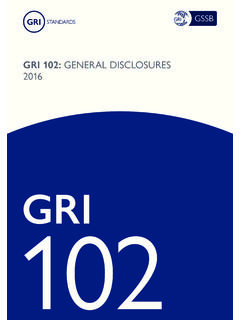Transcription of CCGG POLICY DIRECTOR COMPENSATION
1 ccgg POLICY DIRECTOR COMPENSATION FEBRUARY 2011 1 of 3 1 2 0 A de la ide S t r e e t W e s t , S ui t e 2 5 0 0 , T or o nt o , O N M5 H 1 T1 | 4 1 6 - 8 6 8 - 3 5 7 6 | i nf o @ ccg g . c a | ccgg DIRECTOR COMPENSATION POLICY As directors are fiduciaries, they have a conflict of interest in establishing their own COMPENSATION , as non-executive directors. ccgg , representing the interests of institutional investors in Canada, provides the following set of principles for boards to consider when structuring their own COMPENSATION plans to ensure that their interests are aligned with those of the equity owners of the company.
2 Principle One Independence and Alignment with Shareholders DIRECTOR COMPENSATION should be designed to promote a high degree of objectivity, independent thinking and a direct alignment with the interests of the shareholders and other stakeholders of the company. While DIRECTOR COMPENSATION should be sufficient to adequately reward directors for their expertise and experience and the time devoted to the company, it should not be so high as to potentially compromise the independence of directors, their ability to take a controversial stand on an important issue or their preparedness to resign on a matter of principle.
3 Principle Two Reflect Expertise and Time Commitment Aggregate DIRECTOR COMPENSATION and the structure of DIRECTOR COMPENSATION plans will vary, depending upon company-specific factors such as company size and complexity. Individual DIRECTOR COMPENSATION should reflect the time expected of the DIRECTOR as well as the overall expertise and experience required. Annual grants of COMPENSATION to a DIRECTOR may vary from year to year based on the DIRECTOR s actual time commitment to the Board (often reflected in per meeting fees). In instances where there is an equity-based component of COMPENSATION , the amount should not be determined based on corporate performance, as that may compromise the objectivity of directors as stewards of the company on behalf of shareholders.
4 DIRECTOR COMPENSATION should include appropriate DIRECTOR indemnity and insurance coverage and the reimbursement of reasonable out-of-pocket expenses (such as travel and educational costs), but should not include retirement benefits, change of control or severance provisions, health care coverage, charitable donations, vehicles, clubs, pensions, or other such perquisites. The board may choose to use a COMPENSATION consultant independent of management when contemplating material changes to a DIRECTOR COMPENSATION POLICY or for benchmarking purposes.
5 If a consultant is retained, the board should summarize the advice given to the board in the annual proxy circular. C CG G B O AR D O F D IR EC TO R S CHAIR David Denison CPP Investment Board VICE CHAIR Dan Chornous RBC Global Asset Management DIRECTORS Bill Chinery BlackRock Emilian Groch Alberta Teachers Retirement Fund Stephen A. Jarislowsky Jarislowsky Fraser Wayne Kozun Ontario Teachers Pension Plan Larry Lunn Connor, Clark and Lunn Brian Murdock TD Asset Management Donald F. Reed Franklin Templeton Investments Corp. Kim Shannon Sionna Investment Managers CONTACT US Stephen Griggs Executive DIRECTOR 416-868-3585 Tony D Onofrio DIRECTOR of Issuer Research 416-363-8253 ccgg POLICY DIRECTOR COMPENSATION FEBRUARY 2011 2 of 3 1 2 0 A de la ide S t r e e t W e s t , S ui t e 2 5 0 0 , T or o nt o , O N M5 H 1 T1 | 4 1 6 - 8 6 8 - 3 5 7 6 | i nf o @ ccg g.
6 C a | Principle Three COMPENSATION may vary for different DIRECTOR Roles There should be no distinction in pay for directors performing similar roles. Some differentiation of COMPENSATION levels among directors based on relative time commitment and responsibilities may be appropriate. For example, independent chairs, lead directors and committee chairs typically entail a greater time commitment and may warrant additional COMPENSATION . In addition, particularly time consuming committees such as the Audit Committee and, increasingly, the Human Resources Committee may justify higher per meeting fees.
7 Participation in ad hoc committees would also usually warrant additional COMPENSATION for a DIRECTOR . Principle Four Shareholding by Directors Minimum shareholding requirements for directors (achievable over a predetermined time frame) establish and maintain an alignment of interests between directors and shareholders by requiring directors to have a meaningful investment in the company. Directors should ideally acquire an equity stake in the company upon joining the board and add to that stake over time. Boards should consider requiring a minimum shareholding for directors based on a multiple of their annual COMPENSATION , until their retirement from the board.
8 DIRECTOR COMPENSATION plans can facilitate the achievement of minimum DIRECTOR shareholding requirements and encourage directors to continue to invest in the company beyond the minimum level. Share grants or units with the same economic interest as shares (often called Deferred Stock Units , or DSU s ) are appropriate forms of equity-based COMPENSATION for directors in lieu of cash as they directly align the interests of directors with those of shareholders. Equity-based remuneration should not be subject to vesting periods or performance conditions, other than, for example, Deferred Stock Units which require for Canadian tax purposes that the units be held until retirement from the board.
9 Stock options which provide upside leverage to the share price with no downside exposure - are not appropriate for directors of public companies as they can create incentives for directors which are not well-aligned with the interests of shareholders. Boards should restrict directors from indirectly selling their minimum required ownership interests in shares of the company through appropriate anti-monetization policies. The details of these policies should be publicly disclosed and should include a provision requiring annual disclosure of any DIRECTOR who has monetized a portion of his/her share position during the previous year, in sufficient detail to allow investors to determine a given DIRECTOR s true ownership position.
10 Principle Five - Minimize Complexity and Ensure Transparency Boards should minimize the complexity of DIRECTOR COMPENSATION structures to ensure that the incentives being created are well understood by directors and shareholders. The process used by a board in setting its COMPENSATION should be transparent to shareholders and communicated as a part of the annual reporting process. For example, if the board uses a peer group to determine its COMPENSATION , the peer group should be disclosed in the annual proxy circular. ccgg POLICY DIRECTOR COMPENSATION FEBRUARY 2011 3 of 3 1 2 0 A de la ide S t r e e t W e s t , S ui t e 2 5 0 0 , T or o nt o , O N M5 H 1 T1 | 4 1 6 - 8 6 8 - 3 5 7 6 | i nf o @ ccg g.







